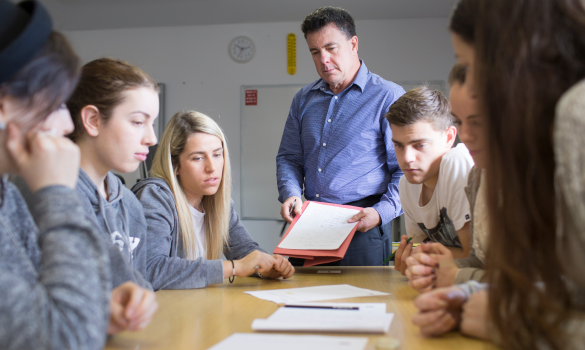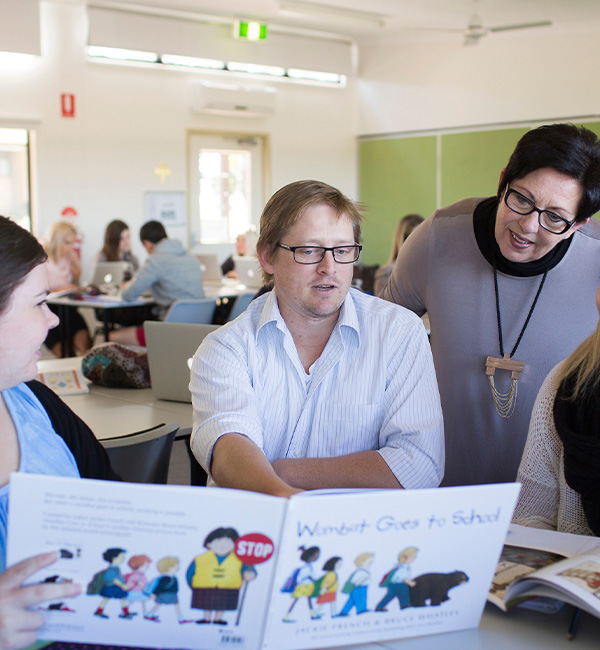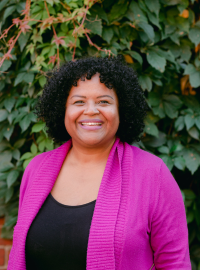Bachelor of Educational Studies
Course information for - 2026 entry
International
- Domestic
- International
- Domestic
- International
Offered at 2 locations
- Melbourne
- Strathfield
- Melbourne
- Strathfield
- Duration
- 3 years full-time or equivalent part-time
- CRICOS Code
- 097980A
- IELTS
- A minimum of 7.0 in Reading and Writing and a minimum of 7.5 in listening and speaking
- Fees (first year)*
- $35624
- Start dates
- February 2026, July 2026
Overview

The Bachelor of Educational Studies allows students to take their first step towards teaching or other education-related fields.
This course is a pathway for students who are passionate about becoming teachers but do not meet the admission rank for their desired pre-service teacher degree. Students not meeting subject prerequisite requirements in QLD and/or VIC should undertake the Diploma in Educational Studies (Tertiary Preparation) as their pathway. Eligible students who successfully complete their first year of study (subject to meeting certain progression and non-academic requirements) may apply for transfer into the second year of the Bachelor of Education suite.
This degree allows students to gain the necessary knowledge to pursue a career in corporate training, educational consultancy, online learning, vocational and community education, curriculum writing, youth services or adult learning.
This course will not lead to early childhood, primary or secondary teacher registration in Australia, and no practicum is undertaken by graduates who complete the three-year course.
Community engagement
Students complete 35 hours of community engagement in EDES103 Understanding Learners and Their Contexts.

Careers
Our graduates have pursued careers in:
- early childhood education
- primary and secondary education
- special education
- adult learning
- corporate training
- curriculum development
- educational design
- education consulting
- vocational education
Course details
Course structure
To complete the Bachelor of Educational Studies, a student must complete 240 credit points (cp).
Course map
Graduate statement
AQF framework
Exit Points
A student who has completed 40 credit points from units prescribed for the Non-Award Certificate in Educational Studies may exit with that award.
A student who has completed 80 credit points from the units prescribed in the Diploma in Educational Studies (Tertiary Preparation) may exit with that award.
Note that none of these qualifications qualifies a student to teach in Australia.
Overseas study available
You’ll have the option of studying Core Curriculum units overseas.
Entry requirements
An applicant must also comply with the Admission to Coursework Programs Policy.
To be eligible for admission into the course, an applicant must have completed:
a. Year 12 with the ACU minimum eligibility rank for Bachelor Programs;
b. Entry via Diploma in Educational Studies (Tertiary Preparation) or Diploma in Educational Studies (Tertiary Preparation) (Away From Base) with course co-ordinator approval; or
c. Entry via an alternative pathway as approved for ACU.
International students need to meet the English Language Proficiency requirements as defined in the Admission to Coursework Program Policy.
Additional Approvals
Requirements for working with children: All students enrolled must have the appropriate approvals before they may enter any context in which they will have contact with children. These are: Blue Card (Qld) or Working with Children Check (ACT, NSW and Vic). International students must bring police check documentation from their own countries. To meet the requirements for working in settings other than schools, a National Police check may be required. All students who have lived in another country for 12 months or more must provide a police check from that country for that period.
Disclaimer: The course entry requirements above are for 2026 Admission. Refer to your relevant Tertiary Admission Centre website for future years' entry requirements.
View transparency admission information
International applicants
If you’re an international applicant you’ll need the equivalent of an Australian Year 12 Certificate.
Find the equivalent qualification for your country
You’ll also need to comply with the Admission to Coursework Programs Policy , including the English Language Proficiency requirements.
If you’re an international student completing one of the following qualifications, you will need to apply for admission through your local Tertiary Admission Centre (TAC) and be assessed on your performance in these studies (i.e. your ATAR or equivalent):
an Australian Year 12 qualification (either outside or in Australia)
an International Baccalaureate (IB) Diploma
a New Zealand National Certificate of Educational Achievement (NCEA) Level 3.
Adjustment factors
If you’re currently completing Year 12 you may be eligible for adjustment factors that can boost your rank and help you get into your desired course.
Adjustment factors may be applied to your TAC application if you study particular subjects, attend schools geographically close to our campuses or in certain regional areas, apply as an elite athlete or performer or meet certain other criteria.
Inherent requirement
There are essential components of a course or unit that demonstrate the capabilities, knowledge and skills to achieve the core learning outcomes of that course or unit. You will need to be able to meet these inherent requirements to complete your course.
Learn more about inherent requirements for your course and how they affect you
Pathways
Pathways into course for international applicants
If you don’t currently meet the direct entry requirements for admission to your chosen program, don’t worry. Our range of pathway programs can help you build the language proficiency, academic skills and confidence you need to succeed.
Further study
Graduates may be eligible to progress to a range of postgraduate coursework programs, e.g. graduate certificate and graduate diploma and, through them and/or with relevant work experience, to master degree programs.
Fees
Course costs
- Unit fee: $4453
- Average first year fee: $35624
- Estimate total cost: $106872
The Tuition fees quoted above are for commencing students in the current year who undertake a normal full-time load. The Unit Fee is based on a 10cp unit. Fees are reviewed annually.
Tuition fees for continuing students may increase by up to 3 percent each year for the minimum duration of the course as provided on your electronic Confirmation of Enrolment (eCOE). Students who continue to study beyond the minimum duration will have the relevant annual commencing rate applied to their fees for subsequent study periods.
Payment options
You should be able to concentrate on getting good marks instead of worrying about how you’ll pay your fees. We have a number of options that can help you ease the financial burden, including government assistance, scholarships and income support.
Scholarships
You could be eligible for one of the hundreds of scholarships we award each year to help students from across the university with the cost of studying, accommodation or overseas study opportunities. Some of our scholarships are awarded on the basis of merit, but these aren’t just for the academically gifted; ACU also recognises excellence in community engagement and leadership. We also offer a range of scholarships for those who may be struggling financially or who have faced other barriers to accessing education.
How to apply
International applicants
Direct application
Apply nowInformation on the application procedure
International students undertaking an Australian Year 12 qualification should apply through the relevant tertiary admissions centre.
Deferment
Yes. See Defer your offer.
Students with a Student Visa will need to complete the program in minimum duration, study at least one subject on-campus each semester and must not undertake more than 33% of the program online
Staff Profile
Dr Lily-claire Deenmamode
National Course Coordinator Pathway programs, School of Education
Originally from Mauritius, Dr Lily-claire Deenmamode joined the Australian Catholic University in 2012 as a doctoral student in Education. She is currently a lecturer in the School of Education teaching Indigenous Knowledges' and Sociology of Education and is the National Course Coordinator for the Pathway programs. Her research interests include the promotion of cultural identity and the enhancement of social justice in & through education. Dr Deenmamode continues to explore how inclusive education reframed within a social justice perspective has the potential to challenge marginalisation, disadvantage and non-recognition.


